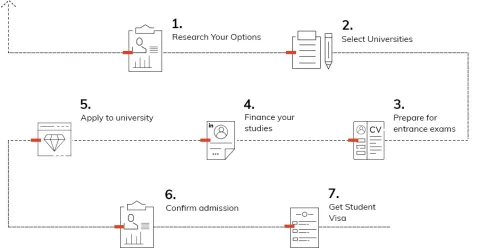- Best Immigration Possibilities
- International Exposure
- Quality Educational Curriculum
- Affordable Education
- Innovative Training and Research Opportunities
- International students can work while studying
Educational Qualification
- You must score at least 60% from a UGC or AICTE-recognized university to graduate.
- The graduation degree has to be completed within the stipulated time with no gap year
Language Test Results
- IELTS/TOEFL Score: Overall 6 with 5.5 in each band.
Backlogs
- Up to 10 backlogs (some private hospital universities may accept more)
Average Annual Fees in CAD
13,000 to 20,000
17,000 to 25,000
7,000 to 15,000
September
January
April/May
Student Applicant
-
Students must be over 18 years of age.
-
International students in Canada universities can work on-campus or off-campus for up to 20 hours during university semesters and full-time during breaks such as the winter or summer holidays, without the need for a work permit.
-
Foreign students who are studying in a program that requires work experience such as through a co-op or internship program.
Spouse
-
In general, spouses are given the same rights as students who are already in Canada. Therefore, if the student with a Canada student visa has the right to work, the spouse who comes to join him or her will also have that right.
Name of University
University of Toronto
McGill University
University of British Columbia
University of Alberta
Université de Montréal
McMaster University
University of Waterloo
Western University
University of Calgary
Queen’s University






Canada Student visa, Study in Canada, canada study visa, international students canadavisa, canada international students visa, study in canada, canada study visa, canada study visa fees, embassy fees for canada study visa, canada visa types, minimum bank balance for canada student visa, canada student visa requirements, canada student visa process
Want to apply for Canada student visa? Learn how to study in Canada, with full details on visa requirements, top courses, fees, scholarships, post-graduation work permits and how to apply.
Study in Canada: Your Complete Guide to Canada Student Visa
Planning to study in Canada? Canada is home to top-ranked universities, a multicultural society, and a clear path for international students to work and settle after graduation. To begin your journey, understanding the Canada student visa process is essential. Whether you're applying for undergraduate or postgraduate programs, the Canada international students visa opens the door to world-class education and global career opportunities.
Tuition fees in Canada range from CAD 15,700 to 53,538 for bachelor's degrees and CAD 9,364 to 45,800 for master's programs. Many students are also exploring ways to study in Canada without IELTS, making it more accessible than ever. After graduation, the post-study work visa lets you gain valuable experience in Canada for up to three years.
At Y-Axis, we simplify the process by guiding you through every step of the Canada study visa application—eligibility, costs, timelines, and more—so you can confidently take the next step in your academic future.
Canada is welcoming 408,000 students in 2026
Canada has released the study program allocation for 2026 and plans to welcome 408,000 international students.
| Category | Allocated Study Permits |
| PAL/ TAL required applicants | 1,80,000 |
| Master’s and doctoral students (PAL/TAL exempt) | 49,000 |
| Primary and secondary school (kindergarten to grade 12, also PAL/TAL exempt) | 1,15,000 |
| Other PAL/TAL-exempt study permit applicants | 64,000 |
| Total | 4,08,000 |
Why Study in Canada?
Eight Canadian universities rank in the top 200 globally (QS World University Rankings). Tuition fees are also more affordable, with international graduate costs averaging CAD 17,338 per year—making Canada a budget-friendly option compared to the US and UK.
Top Benefits for International Students Planning to Study in Canada:
- Work flexibility: Students can work up to 24 hours weekly during semesters and full-time during breaks. This helps cover education costs while building valuable experience.
- Post-graduation opportunities: The Post-Graduation Work Permit (PGWP) lets you work in Canada for up to three years after graduation. This opens a path to permanent residency.
- Safety and quality of life: Canada sits at 11th place on the Global Peace Index (2024). This makes it one of the safest places for international students. More than that, it ranks #3 out of 85 countries for quality of life.
- Cultural diversity: The country houses over 200 different ethnicities. Half the population speaks a first language other than English. Students experience a truly global environment during their studies.
Scholarship to study in Canada options are many. Government-funded scholarships, non-government awards, and institutional scholarships make education more available.
Canada International Students Visa for Indians
For Indians and other international students, obtaining a Canada international students visa is a crucial step to study and live in this diverse and welcoming country. This visa not only allows access to world-class education but also offers opportunities for work and permanent residency. In this guide, we’ll walk you through everything you need to know about the Canada international students visa process, eligibility criteria, and tips specifically for Indian applicants.
Canada Student Visa Requirements:
If you're planning to study in Canada, applying for a student visa (study permit) is one of the most important steps. Canada welcomes thousands of international students each year, but you must meet a specific set of requirements to be eligible.
Here’s a detailed look at the Canada study visa requirements in 2025 — explained in a way that's easy to understand.
First and foremost, you’ll need an acceptance letter from a recognized Canadian institution. This must be a Designated Learning Institution (DLI), which means the school is officially approved to host international students.
Next, you'll need to prove that you have enough money to support yourself in Canada. This includes covering your tuition fees, daily living expenses, and return travel for yourself (and any family members, if applicable). As of 2024, students must show at least CAD 10,000 per year, not including tuition.
Here’s a breakdown of the main Canada Study Visa Requirements:
-
Letter of Acceptance from a DLI – A must-have document confirming your admission into a Canadian college or university.
-
Proof of Sufficient Funds – You’ll need to show financial documents like bank statements or GICs proving you can afford tuition, living costs, and travel.
-
Valid Passport – Your passport should be valid through the entire duration of your program.
-
Provincial Attestation Letter (PAL) – Required for certain provinces to confirm that your admission is within their student visa limits.
-
Language Proficiency Test – Most universities ask for IELTS or TOEFL scores. Some allow study in Canada without IELTS, but that's rare.
-
Biometrics – You may need to provide fingerprints and a photo at a Visa Application Centre.
-
Medical Exam – If you're staying for over 6 months or coming from a specific country, a medical exam with a certified doctor may be needed.
-
Police Clearance Certificate – To prove you have no criminal background, often required during visa processing.
-
Letter of Explanation – Helps explain your academic goals and shows that you plan to return home after your studies.
-
Proof of Ties to Your Home Country – Documents like property ownership, job offer letters, or family commitments can strengthen your application.
-
Quebec Acceptance Certificate (CAQ) – If you're planning to study in Quebec, this additional document is required before your study permit.
Depending on your nationality, you may also need a Temporary Resident Visa (TRV) or an Electronic Travel Authorization (eTA). These are often issued automatically once your visa is approved.
Preparing all these documents carefully is key to getting your Canada study visa approved without delays. Whether you're planning to study in Canada after 12th or apply for a postgraduate program, being well-informed about the visa process helps you plan smarter and worry less.
Canada Student Visa Application Process
This visa differs from tourist permits and gives you legal permission to enroll in designated educational institutions throughout your program duration.
Step 1: Get Letter of Acceptance
Secure acceptance from a designated learning institution (DLI) in Canada.
Step 2: Prepare Documents
Collect proof of funds (minimum CAD 20,635 per year), valid passport, language test scores (IELTS/TOEFL/TEF), police clearance, medical exam (if needed), and Provincial Attestation Letter (PAL) if required.
Step 3: Apply Online
Submit your application and pay the Canada student visa fees through the IRCC website.
Step 4: Provide Biometrics
Visit a Visa Application Centre to submit fingerprints and photos.
Step 5: Wait for Processing
Processing can take 1 to 16 weeks; be ready for any additional requests.
Step 6: Receive Study Permit
Once approved, you can travel and start your journey to study in Canada.
Y-Axis Advantage: We guide you through every step, from application to understanding work permit after study in Canada.
Canada Student Visa Processing Time for Indian Students in 2025 (Latest Update)
As of 2025, the Canada student visa processing time for Indian students is typically 3 to 5 weeks when applying online from outside Canada. This is a faster turnaround compared to previous years, making it easier for Indian applicants to plan ahead. However, actual timelines may vary based on several factors, including document completeness, biometric and background checks, application accuracy, IRCC response time, and seasonal intake volume (especially May to August).
Students applying from inside Canada (for permit extensions or status changes) can expect a longer wait—up to 14 weeks. Meanwhile, paper-based or embassy-submitted applications may still involve 3–4 extra weeks for mailing and manual processing. For minor applicants (under 18), especially those routed through processing centers like Nova Scotia, processing times may stretch to 6–8 months.
👉 Tip for Indian Students: Apply at least 90 days before your course start date—ideally by May or early June for the September intake—to avoid delays.
Documents Required for Canada Student Visa Application
A detailed study in Canada for Indian students application package needs:
- Valid passport
- Original letter of acceptance from your DLI
- Proof of financial support (bank statements, GICs)
- Immigration Medical Examination results if applicable
- Statement of Purpose explaining your educational goals
- Passport-sized photographs meeting specified standards
- Language proficiency test scores (IELTS/TOEFL)
- Provincial attestation letter for undergraduate programs
You'll receive either an electronic travel authorization (eTA) or visitor visa based on your citizenship. Border services officers will issue your study permit after they review your letter of introduction when you arrive in Canada.
Canadian Education System
Canada’s education system is globally respected, with each province and territory overseeing its own schools and institutions. To study abroad in Canada, international students must understand how the system works—from choosing between colleges and universities to meeting admission standards. Equally important are the student visa requirements for Canada, which include securing a study permit, proof of funds, and an acceptance letter from a designated institution.
Types of institutions: Colleges vs Universities
Canadian colleges and universities have a clearer difference than many other countries. This is vital information for Canada international students who need to pick the right educational path.
Universities focus on academic and theoretical knowledge. They offer undergraduate and graduate degrees including bachelor's, master's, and doctoral programs. Research activities and scholarly work are the foundations of their programs. Students can get detailed education in a variety of disciplines. A bachelor's degree takes 3-4 years to complete, and universities have higher academic entrance requirements than colleges.
Colleges focus on career-oriented, practical training for specific jobs or trades. Programs include diplomas, certificates, and some applied degrees. Most programs last from a few months to two years. These programs give you the hands-on skills you need at work. Classes are smaller, so students receive more personal attention.
This setup helps Canada for Indian students make better choices. Many pick universities for traditional academic paths, while others choose colleges to start their careers faster.
Study Levels and Durations
Students can choose from several qualification levels in Canadian post-secondary education:
- Certificates: Take 3-8 months of specialized post-secondary study
- Diplomas: Need two years of specialized study
- Associate Degrees: Cover two-year, 60-credit foundational undergraduate programs
- Bachelor's Degrees: Take four years of full-time study
- Master's Degrees: Need 1-3 years of specialized post-graduate study
- Doctoral Degrees: Require 2-3 years of coursework plus an independent dissertation
Students thinking about why study in Canada should plan for at least four years to finish a bachelor's degree. Many educational paths exist, including credit transfers between schools. Students can start at a college and move their credits to a university to complete a bachelor's degree.
Designated Learning Institutions (DLIs)
Acceptance from a Designated Learning Institution (DLI) is vital for study in Canada requirements. Provincial or territorial governments approve these schools to accept international students.
Your Canada Student Visa application needs an acceptance letter from a DLI. Applications without this letter face rejection. All primary and secondary schools automatically qualify as DLIs. Post-secondary schools must apply for this special status.
Remember that not all DLIs offer programs qualifying for the Post-Graduation Work Permit Program (PGWPP). Check if your chosen school and program qualify for PGWPP before applying if you want to get a work permit after study in Canada.
PGWP eligibility rules change on November 1, 2024. New language proficiency or program requirements may apply based on when you submit your study permit application.
Each DLI has its own identification number starting with 'O'. You'll need this for your study permit application. Picking the right DLI shapes your education, post-graduation options, and possible paths to permanent residency when studying in Canada.
Top Universities in Canada For International Students (QS Ranked 2025)
Your choice of institution and program shapes your educational trip and career future a lot when you study in Canada. More than 250,000 international students study at Canadian institutions, so you need to know about the best universities and programs to make smart choices.
The following are the Top universities in Canada as per QS World Ranking 2024.
|
QS World University Rankings – Top Universities in Canada |
||
|
Serial No. |
Global Rank |
University |
|
1 |
#26 |
|
|
2 |
#27 |
|
|
3 |
#46 |
|
|
4 |
#111 |
|
|
5 |
#126 |
|
|
6 |
#140 |
|
|
7 |
#149 |
|
|
8 |
#170 |
|
|
9 |
#230 |
|
|
10 |
#235 |
|
|
11 |
#240 |
|
|
12 |
#272 |
Dalhousie University |
|
13 |
#298 |
|
|
14 |
#334 |
|
|
15 |
#414 |
Université Laval |
|
16 |
458 |
University of Saskatchewan |
|
17 |
#494 |
|
|
18 |
521-530 |
Concordia University |
|
19 |
581-590 |
University of Guelph |
|
20 |
591-600 |
Université du Québec |
|
21 |
601-650 |
Carleton University |
|
22 |
601-650 |
University of Manitoba |
|
23 |
651-700 |
University of New Brunswick |
|
24 |
701-750 |
University of Windsor |
|
25 |
751-800 |
Memorial University of Newfoundland |
|
26 |
751-800 |
Université de Sherbrooke |
|
27 |
801-1000 |
|
Source: QS World University Rankings 2024
For Admission Assistance to Canadian universities, consult Y-Axis!
Popular Courses to Study in Canada
If you’re planning to study in Canada, choosing the right course is just as important as securing your study permit. Canada offers a wide range of programs that are globally recognized, career-focused, and in high demand across industries.
Below is a detailed table of popular courses in Canada for international students, including duration, estimated tuition fees, and eligibility criteria to help you make an informed decision.
| Course / Program | Duration | Annual Fees (CAD) | Eligibility Criteria |
|---|---|---|---|
| MBA (Master of Business Administration) | 1–2 years | 30,000 – 60,000 | Bachelor’s degree, IELTS 6.5–7.0, often GMAT, 1–3 years of work experience |
| Master of Computer Science / Data Science | 1–2 years | 20,000 – 45,000 | Bachelor’s in CS/IT, IELTS 6.5–7.0, some programs may require GRE |
| Master of Engineering (MEng) | 1–2 years | 20,000 – 40,000 | Bachelor’s in Engineering, IELTS 6.5–7.0 |
| Master of Science (Biology, Chemistry, Physics) | ~2 years | 18,000 – 35,000 | Bachelor’s in Science, IELTS 6.5, may need a research proposal |
| Master of Public Health (MPH) | 1.5–2 years | 20,000 – 38,000 | Bachelor’s in Health or Science, IELTS 6.5–7.0, work experience preferred |
| Master of Finance / Information Technology | 1–2 years | 20,000 – 50,000 | Bachelor’s in relevant field, IELTS 6.5–7.0, GMAT may be required for finance |
| Bachelor of Science in Nursing (BSc Nursing) | 2–4 years | Around 33,000 | High school diploma with science background, IELTS or TOEFL |
| Master of Science in Nursing (MSc Nursing) | ~2 years | Around 44,000 | Bachelor’s in Nursing, IELTS or TOEFL, clinical experience |
| MA Media / Communication Studies | 2 years | 17,800 – 35,000 | Bachelor’s in Arts or Media, IELTS or TOEFL |
| Top MBA Programs (e.g., U of T, UBC) | 2 years | 56,000 – 133,000 | Bachelor’s degree, IELTS/TOEFL, GRE/GMAT, strong academic and professional profile |
How to Choose the Right Program
-
Align with your academic background and career goals
-
Ensure you meet the language requirements (usually IELTS 6.5 or higher)
-
Check if standardized tests like GMAT or GRE are needed
-
Review the cost and duration of your preferred course
-
Look into universities that match your budget and career path
Let me know if you’d like a breakdown of the best universities for each course, PR pathways, or a PDF version of this table!
Best Study Programs in Canada for Indian Students
Indian students who want to study in Canada often choose engineering programs. Canada has some of the world's best engineering schools. Students love the practical approach and research opportunities these programs offer.
Information Technology and Computer Science rank high for Indian students checking their Canada Student Visa Eligibility. The University of Toronto, the University of British Columbia, and the University of Waterloo offer advanced curriculum and research facilities.
Business courses remain a top choice. QS MBA Rankings (2023) lists 17 Canadian universities in the top 500 globally for MBA programs. These degrees help students develop analytical, organizational, and management skills that global employers value.
Healthcare programs attract more Indian students looking at why study in Canada options. Canada's healthcare system ranks among the world's best, creating more jobs for skilled professionals. Universities like Toronto, British Columbia, McGill, and Dalhousie offer excellent health science education.
This knowledge about educational opportunities helps students arrange their career goals with the right institution and program when planning to get a Canada study visa.
How Much Does It Cost to Study in Canada?
Understanding everything in studying in Canada is a vital step in your educational planning. Canada provides an attractive mix of quality education and reasonable costs that makes it a smart financial choice for international students.
Average tuition fees by program level: Canada international students pay tuition fees that vary by a lot based on their program, field, and choice of institution. Statistics Canada reports the weighted average tuition for international undergraduate students in 2024 stands at CAD 36,100 (INR 3,384,921) per year. This shows a 7.6% rise from previous years.
Students can expect these program costs:
| Program Level | Annual Tuition Range (CAD) | Annual Tuition Range (INR) |
|---|---|---|
| Undergraduate | CAD 15,700-53,538 | INR 9.54-32.52 Lakhs |
| Postgraduate | CAD 13,742-45,800 | INR 8.35-27.82 Lakhs |
| PhD | CAD 7,000-15,142 | INR 4.46 lakh – INR 12.74 lakh |
| MBA | CAD 30,000-42,000 | INR 25.31-33.75 Lakhs |
Humanities and education programs cost less, while medicine, engineering, and business programs demand higher fees. Dentistry programs cost around CAD 19,500 (INR 1,832,490). Engineering programs at leading universities range from CAD 38,378 (INR 3,837,825) at University of Alberta to CAD 61,597 (INR 6,159,772) at University of Waterloo.
Cost of Living for Indian Students in Canada
The cost of living in Canada changes based on your location. Single students spend about CAD 880 (INR 53,034) monthly without rent. Housing costs take up the largest part of expenses and differ between cities.
Toronto and Vancouver lead as the most expensive cities, with monthly costs between CAD 1,945-3,713. Montreal and Edmonton provide more budget-friendly options ranging from CAD 1,386-1,580 monthly.
Housing options and their costs:
- On-campus housing: CAD 8,000-10,000 annually
- Shared off-campus housing: CAD 400-700 monthly
- Homestay arrangements: CAD 400-800 monthly
Canada international students should budget monthly for:
- Food and groceries: CAD 300-400
- Transportation: CAD 80-110
- Phone and internet: CAD 118-158
- Health insurance: CAD 50-75 per month
What Is the Cost to Study in Canada for International Students?
The Canadian government raised financial requirements for study in Canada for Indian students and others starting January 1, 2024. Immigration, Refugees and Citizenship Canada (IRCC) now asks students to prove funds of CAD 20,635 (INR 1,741,190), not counting tuition.
Students bringing family members need more funds:
- Two people (including student): CAD 25,690 (INR 2,167,733)
- Three people: CAD 31,583 (INR 2,664,987)
First-year costs for a Canada study visa usually total between CAD 35,000-50,000 (INR 21-30 Lakhs), combining tuition and living expenses. This makes careful financial planning necessary for future Canada international students.
Students can show their funds through Canadian bank accounts, Guaranteed Investment Certificates (GICs), four months of bank statements, or student loan proof.
Scholarships to Study in Canada
You can get financial support to achieve your academic goals through many scholarships to study in Canada. Canadian universities charge between CAD 15,700-53,538 for undergraduate programs. Getting scholarships is a big deal as it means that you can reduce your costs and boost your academic profile.
Types of scholarships available
Scholarships for international students in Canada come in three main categories:
-
Government-Funded Scholarships: The government gives these merit-based awards to outstanding students. The Vanier Canada Graduate Scholarships (CAD 50,000 per year for three years), Ontario Trillium Scholarships, and Canada-ASEAN Scholarships are great examples.
-
Non-Government Scholarships: Private companies, charities, and foundations provide these awards. The Shastri Indo-Canadian Institute Scholarships and Anne Vallee Ecological Fund (CAD 1,500 for two years) are available. These awards target specific fields or student groups.
-
Institution-Specific Scholarships: Canadian universities have their own scholarship programs. The University of Toronto's Lester B. Pearson International Scholarship, to name just one example, covers tuition, books, and residence support for four years. This makes studying in Canada more affordable.
Top scholarships for Indian students
Several prestigious scholarships help Canada for Indian students:
-
Shastri Indo-Canadian Institute Scholarships: These scholarships give various fellowships from graduate to post-doctorate levels. The Shastri Research Student Fellowship supports students in Bachelor's, Master's, or M.Phil programs.
-
Canadian Commonwealth Scholarship and Fellowship Plan: This plan picks bright students from Commonwealth countries and pays for travel, living costs, and tuition fees. Graduate Students Exchanges provide INR 843,804 for 5-6 months in Canada.
-
Vanier Canada Graduate Scholarships: The Government of Canada awards these to exceptional doctoral students. They're worth CAD 50,000 yearly for three years (non-renewable).
-
Ontario Trillium Scholarship: Students can get INR 3,375,218 yearly. The scholarship runs up to four years with 75 awards each year.
How to apply for a scholarship to study in Canada
Your chances of getting a Canada study visa and scholarship funding will improve if you:
-
Look at all options through universities, government programs, and private organizations.
-
Get your documents ready - academic transcripts, recommendation letters, CV, and personal statements.
-
Check the eligibility criteria - good grades, leadership skills, and community work matter.
-
Send applications early - deadlines vary, so apply 6-12 months before your program starts.
-
Keep your grades high - Canadian scholarships need at least 80% GPA.
-
Show your leadership skills and extra activities in applications.
A winning scholarship application for study in Canada for Indian students needs good preparation and attention to detail. Make sure you highlight your achievements and strengths. Good research and dedication will help you get financial support to study in Canada.
Work and Placement Opportunities in Canada
Canada not only provides excellent education but also gives you great work opportunities that improve your student experience and future career. Students who study in Canada can work part-time during their studies and have many options after graduation.
Part-time work options while studying
Starting November 8, 2024, Canada international students can work up to 24 hours per week during school terms. This is more than the old limit of 20 hours. You can work as much as you want during summer and winter breaks, which helps you manage your finances throughout your student trip.
You need to be a full-time student at a Designated Learning Institution in a post-secondary program that runs for at least six months to work off-campus. You can still work even with a part-time course load in your final semester if that's all you need to graduate.
Students studying in Canada often work in these roles:
- On-campus jobs (research assistants, library employees, campus bookstore staff)
- Off-campus jobs (baristas, sales associates, tutors, translators)
Post-Study Work Permit in Canada: Opportunities for Graduates
The Post-Graduation Work Permit (PGWP) is the life-blood of opportunities for Canada international students. This open work permit after study in Canada lets you work for any employer and build valuable Canadian experience.
Your program length determines your PGWP duration:
- 8 months to under 2 years: PGWP matches program length
- 2+ years: 3-year PGWP
- Master's programs (8+ months): 3-year PGWP
The PGWP opens doors to permanent residency. Graduates can apply through Express Entry and Provincial Nominee Programs using their Canadian work experience.
Job sectors and average salaries
Canada's job market looks promising in several sectors. Healthcare, food services, retail, manufacturing, and construction have the most job openings.
Annual salaries differ by industry:
- Mining and oil extraction: CAD 113,506 (₹69.23 Lakhs)
- Utilities: CAD 101,531 (₹61.93 Lakhs)
- Finance and insurance: CAD 76,843 (₹46.87 Lakhs)
- Technology: CAD 80,000-110,000 for Software Developers
Your location affects your pay. Toronto's average salary reaches CAD 70,000 (₹43.23 Lakhs) while Montreal offers CAD 60,000 (₹37.06 Lakhs).
How Canada Stands Out Among Top Study Destinations
Your options to study abroad in Canada versus other popular destinations deserve a closer look. The US has 40 universities in the top 100 global rankings while Canada has 5. Yet, these numbers match up well when you think over the population size.
Canada international students get better benefits than other countries. All major destinations allow 20 hours of work per week during studies. However, Canada's post-graduation paths are much simpler. The PGWP program helps graduates get valuable Canadian work experience. Other countries have stricter post-study visa rules.
Canadian graduate programs cost less than other English-speaking countries. Canadian universities also lead in research and breakthroughs. The country ranks in the top 10 globally for scientific effect.
Immigration paths in Canada shine through its Express Entry system. Provincial Nominee Programs target international graduates. These well-laid-out paths make Canada perfect for students who want to settle long-term.
Is Canada good for Indian students?
The numbers tell the story for those thinking about study in Canada for Indian students. MEA India reports 427,000 Indian students currently study in Canadian universities – more than any other country. Indian students make up about 30% of Canada's international student community.
Canada for Indian students brings special advantages:
Students can gain up to 16 months of real-life work experience during a four-year degree program. This hands-on approach gives them an edge in the job market after graduation.
The rich cultural mix makes settling in easier. Canada celebrates festivals from all cultures. From Christmas to Diwali and Chinese New Year to Holi, everyone feels at home here.
Immigration, Refugees and Citizenship Canada (IRCC) offers many paths to permanent residency. They know international students understand Canada's culture and work environment well, making them great candidates for immigration.
Canada Student Visa Eligibility rules are clear, but getting approved isn't guaranteed. Canada turned down 40% of study permit applications in 2021. All the same, Canadian immigration policies welcomed nearly 8 million permanent residents by 2021. This shows the country's strong commitment to diversity and inclusion.
How Y-Axis Makes Studying in Canada Easier and Hassle-Free
Y-Axis can assist by giving more vital support to aspirants who wish to study in Canada. The support process includes
- Free Counseling: Professional counseling for your selection of appropriate course and university.
- Campus Ready Program: Navigate to study in Canada with the best and ideal course.
- Course Recommendation: Y-Path gives unbiased advice on choosing the right path for successful career growth.
- Coaching: We assist you with IELTS live classes to improve your score.
- Canada Student Visa: Our expert team helps you in all steps to get a Canada student visa.

